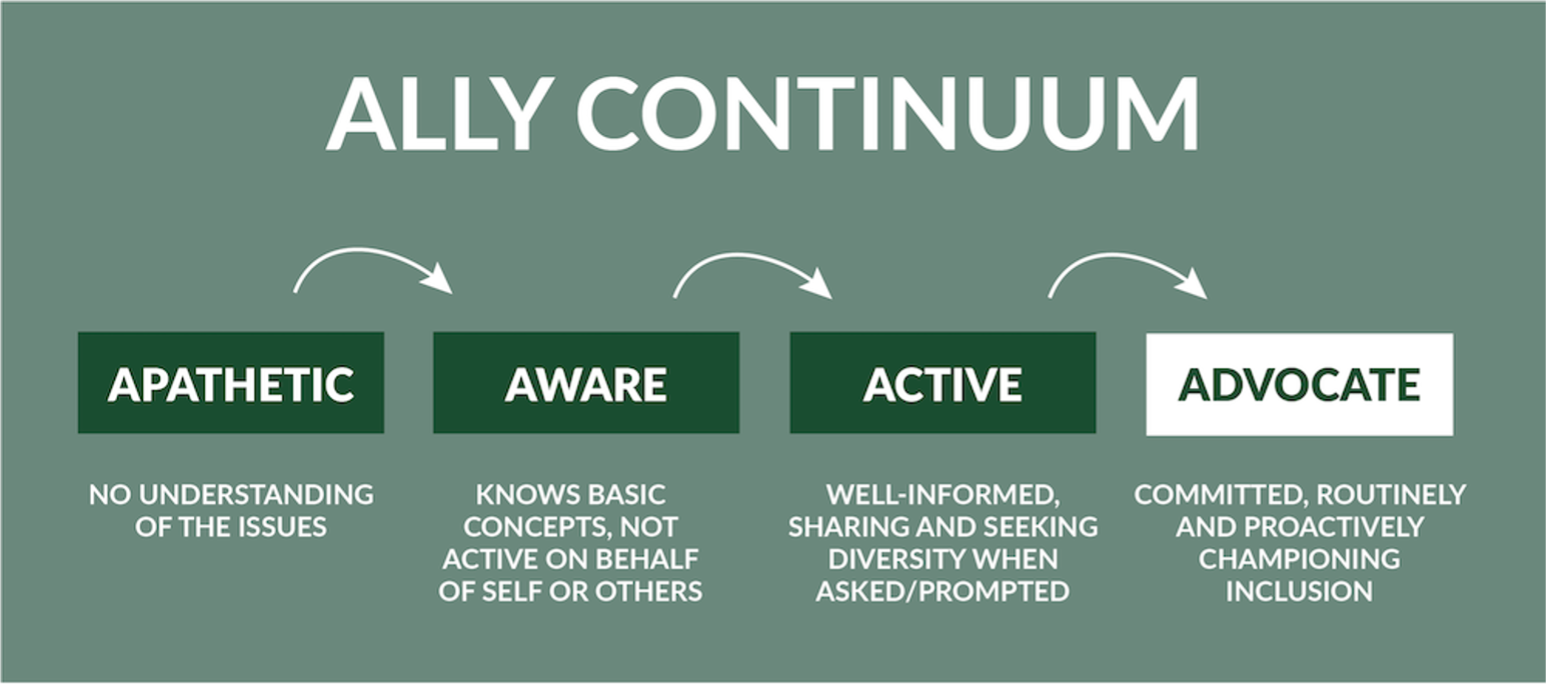What is Allyship?
Allyship means using your personal position of privilege to show up for and support those who are in less privileged positions or marginalised groups. Allies are people who are outside of a marginalised group but take action to support and help amplify the voices of the people in that group.
Who can be an Ally?
Anyone! We all have different life experiences, characteristics and qualities that make up our intersectional identities. Some aspects of our identities afford us privileges, and some marginalise us. It’s important to recognise your own privilege and understand how to leverage it to support others. Anyone can use the parts of their identity that allow them privileges to advocate for others who don’t benefit from the same advantages.
As an Ally you are lending your privilege, access and visibility to someone who doesn’t have the same advantages as you.

The Ally Continuum:
The Ally Continuum is a concept developed by Jennifer Brown (award-winning speaker, D&I consultant, and author) that highlights allyship as a spectrum, where people can constantly learn and grow, rather than one fixed state. The continuum breaks down allyship into four key stages that show the behaviours we exhibit on the journey to becoming active and effective allies; as we move from unawareness to becoming and an advocate for those around us.
Viewing allyship as this continuous journey allows us to constantly learn and change. Everyone will make mistakes or use their knowledge in the wrong way at some point, but the key is to be open and receptive to learning and doing better for the people you advocate for.
How do we practice this in the workplace?
Allyship in the workplace is crucial for inclusion and equity, whether you are an employee, a manager, director or CEO, you should be showing up as an ally for those around you.
As an ally in the workplace you create partnerships that raise awareness, and advocate on behalf of marginalised co-workers. This helps them feel heard, valued and included. It can be hard to know where to begin but below are some tips on how to start your allyship journey.
- Learn - to be an effective workplace ally it is imperative to first educate yourself. Try to learn and understand the issues effecting certain marginalised groups and the barriers they are facing. You will never be able to understand in the same capacity as someone from that group, and that’s okay, but doing your own learning will give you a greater understanding of their experiences and how you could offer support.
- Listen - once you have started to understand what certain groups might be struggling with at work, it is important to listen to those people. Everyone will want allyship to look different and what you deem to be helpful may come across as insensitive or overstepping for some people. Listen to what people need and discuss with them how your position could best be used to help them get that.
- Actions - education is a constant journey and the foundation to becoming an effective ally. But now that you are armed with knowledge, the actions you take are what really counts. There are a number of ways you can be an active ally at work, for example:
- Share opportunities with others - can you pass an opportunity to someone who has been excluded?
- Self reflect on your own behaviours - are you open to feedback without defensiveness?
- Speak up against discrimination or microaggressions - are you advocating for others when you see something that’s not right?
- Mentor others - can you use your position to give someone else a platform?
- Raise issues or topics with senior leaders - are you in a position of power that you could use to benefit other groups?
- Share the spotlight - can you use your privilege to amplify the voices and achievements of others?
- Share information and raise awareness - can you use your network to educate others and raise awareness on issues faced by marginalised groups?
Calling yourself an ally is much easier than being one, but as long as you are moving forwards on your journey to becoming an ally, and learning along the way, you’re moving in the right direction. By consciously thinking about how you can better show up for those around you in your workplace and supporting them through active allyship, you are creating a more inclusive environment and safer space for everyone.

